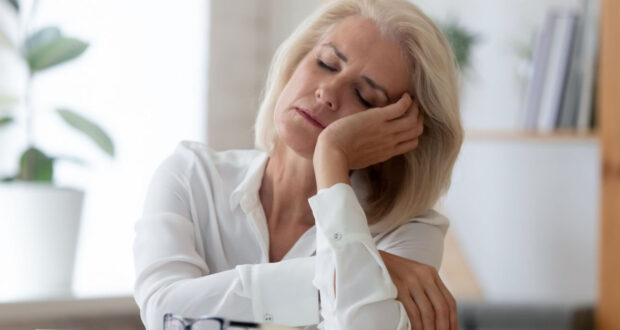By: Red Hot Mamas
Published: March 20, 2023
“When making your choice in life, do not neglect to live”
-Samuel Johnson
Dear Red Hot Mamas,
Do you ever wake up in the morning feeling like you want to just pull the covers up over your head? I know that feeling has happened to me on more than one occasion especially on the days in which I feel tremendously sleepy and sluggish. I’ve often wondered whether it is because of the gray sky of the weather or is it menopause making me feel like a drowsy ball of somnolence?
Fatigue is a common, distressing problem at menopause. Many women experience a significant lack of energy and tiredness which can lead to irritability, anxiety, stress, mood swings and even lead to depression. Chronic fatigue can also lead to physical problems, including blurry vision and problems hearing. Yuck! Bottom line, it can really make you feel lousy. And, as if menopause doesn’t do enough of a number on your sex life, fatigue can contribute to having sex look like a thing of the past. If it gets out of control, it can greatly affect relationships with friends, coworkers, and family.
What’s Going On?
As you grow older, your body is changing and working hard to acclimate to diminished hormone levels which bring upon a host of menopausal symptoms. Chances are you’re living your life as you did prior to menopause (as you should). You probably carry the same workload, take on the same responsibilities and try to be the power woman you always are. Sometimes it is easy to forget your body is in transition. It may catch up to you in different ways emotionally and physically.
On top of that, some of us have potential stressors in our lives, such as personal or family medical problems, divorce, widowhood, concerns about aging parents and caring for adolescent children, as well as pressures at work.
Before you know it, all of these factors may cause us to have insomnia which makes us feel totally drained and exhausted. Insomnia is defined as an inability to sleep through the night. You may suddenly wake up during the middle of the night and simply can’t go back to sleep. This certainly can be very disturbing. Insomnia is one of the major contributors to fatigue.
There are many reasons contributing to insomnia at menopause:
- Hot flashes and night sweats
- Sleep apnea
- Depression and/or anxiety
- Life stressors
- Other health issues (including thyroid problems, pain, urinary incontinence, etc.)
Getting a good night’s sleep is the first step. Women should aim for between seven and eight hours of quality, uninterrupted sleep per night. On average, 7-8 hours of sleep a night is recommended.
There are steps you can take to get better sleep.
If you think you’re not getting a good night’s sleep, try some other lifestyle changes to fight fatigue:
- Exercise can fight fatigue. Exercise can help with our sleep quality. Discuss with your doctor what level of exercise is best for you. But be consistent with your exercise routine but just make sure you don’t work out too close to bedtime.
- Eat the right foods. Healthy, light meals are best. Always eat breakfast as it will help to raise your blood sugar level and boost your energy level for the day.
- Stay hydrated and drink at least 8 glasses of water every day.
- Reduce caffeine and alcohol consumption
- De-stress. Try deep breathing techniques, stress reducing activities like yoga, massage, and meditation.
- Don’t watch television or use any electronic devices before dozing off
Talk to your doctor about medication and therapies:
- Menopausal hormone therapies. Hot flashes are the number one cause of inadequate sleep at menopause. Hormones improve sleep quality by relieving menopausal symptoms such as hot flashes and night sweats.
- Low-dose birth control pills may help to stabilize hormone levels which could ease insomnia.
- Low dose antidepressants and selective serotonin reuptake inhibitors (SSRIs) have been shown to help with sleep symptoms which can relieve menopausal symptoms, including hot flashes.
- Melatonin may help to restore your sleep cycle.
- Cognitive behavioral therapy is often helpful to improve sleep in women.
Bottom line, talk to your doctor if you are having trouble sleeping.
Good Health to You All,
Karen Giblin
 Red Hot Mamas In Charge of Change.
Red Hot Mamas In Charge of Change.




